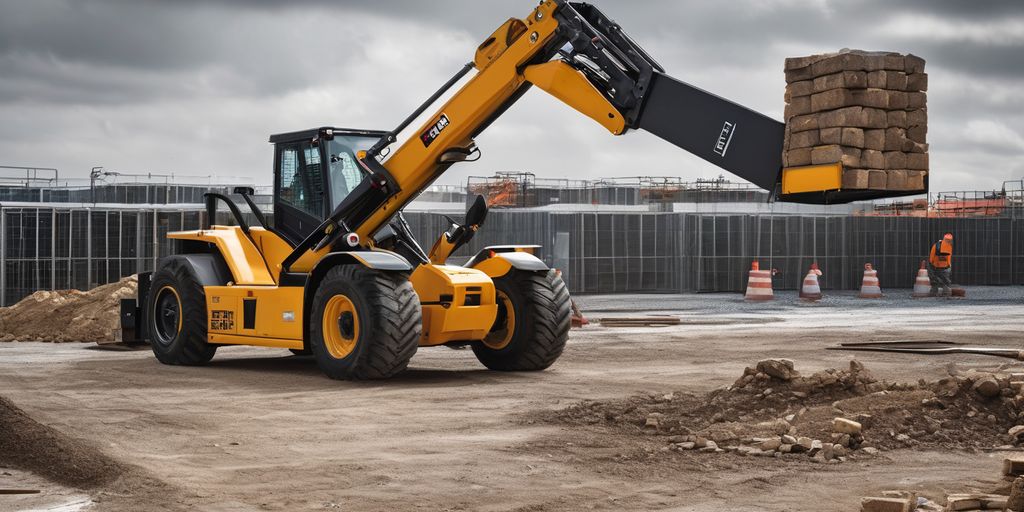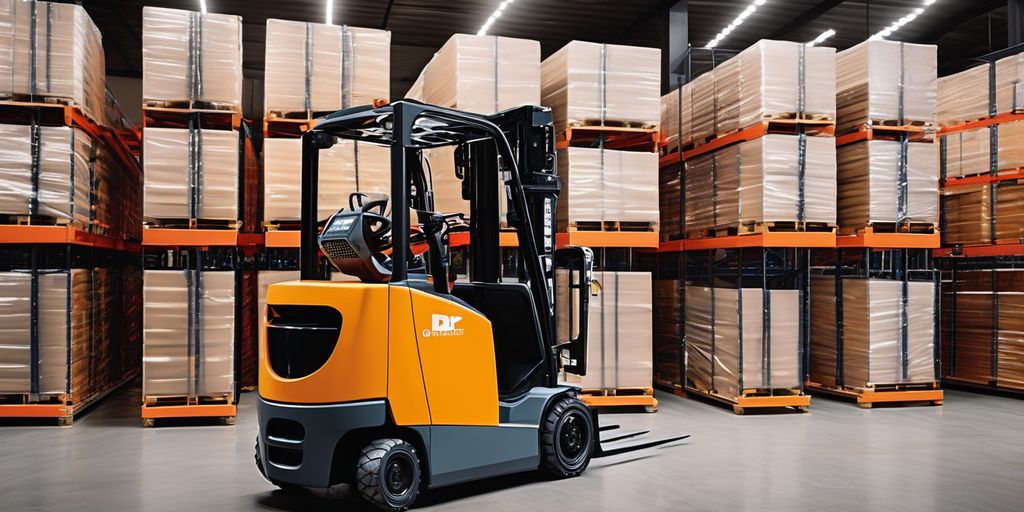Purchasing a used forklift can be a cost-effective solution for businesses needing reliable material handling equipment. However, it's essential to approach the buying process with diligence to ensure you get a machine that meets your needs and is in good condition. This guide will walk you through the key factors to consider, common pitfalls to avoid, and the benefits of buying a used forklift.
Key Takeaways
- Always have a qualified forklift technician inspect the mast, transmission, and safety components before purchasing.
- Check the maintenance history to avoid unforeseen issues and ensure the forklift has been well cared for.
- Evaluate the condition of the tires as they can indicate the environment in which the forklift was used.
- Consider your specific usage requirements, including fuel type preferences and budget constraints.
- Test drive the forklift and review its service records to ensure it meets your operational needs.
Key Factors to Consider When Buying a Used Forklift
When searching for a pre-owned forklift, several critical factors must be evaluated to ensure you make a wise investment. Understanding these key considerations can help you avoid costly mistakes and select a forklift that meets your operational needs effectively.
Common Pitfalls to Avoid When Purchasing Pre-Owned Forklifts
When buying a used forklift, it's crucial to be aware of common pitfalls that can lead to costly mistakes down the line. Avoiding these pitfalls can save you thousands in repairs and ownership costs. Here are some key areas to focus on:
Overlooking Maintenance History
One of the most critical aspects to consider is the forklift's maintenance history. A well-documented history can provide insights into how well the machine has been cared for. Ignoring this can lead to unexpected breakdowns and higher maintenance costs.
Ignoring Signs of Wear and Tear
Pay close attention to any signs of wear and tear. This includes checking the mast, transmission, and safety components like the seatbelt, horn, and lights. Bad tires, for instance, can indicate that the forklift has been used in a rough environment, which may lead to issues down the road.
Skipping Professional Inspection
Always have a qualified forklift technician inspect the lift before purchase. Skipping this step can result in regrettable decisions. A professional inspection can identify hidden problems that you might miss, ensuring you get your money's worth.
Proper inspection and attention to detail are essential when purchasing a pre-owned forklift. Neglecting these steps can lead to significant future expenses and operational downtime.
Benefits of Opting for a Used Forklift

When considering the purchase of a forklift, opting for a used model can offer several significant advantages. These benefits can be particularly appealing to businesses looking to expand their fleet without incurring the high costs associated with new equipment.
Essential Questions to Ask Before Buying
Before finalizing your purchase, consider addressing the following questions to ensure you make an informed decision:
Usage Requirements
How much do you rely on a forklift daily? Understanding your usage needs is crucial. Will this usage increase over the next year or during seasonal peaks? This will help determine the type and durability of the forklift you need.
Fuel Type Preferences
What type of fuel does the forklift use? Different fuel types have various implications for cost, maintenance, and environmental impact. Decide whether you prefer electric, diesel, or propane-powered forklifts based on your operational needs and budget.
Budget Considerations
What is your budget for purchasing a used forklift? Establishing a clear budget helps narrow down your options and ensures you don't overspend. Consider not just the purchase price but also potential maintenance and operational costs.
Asking the right questions can save you from future headaches and ensure you get a forklift that meets your needs and expectations.
Inspection Tips for Ensuring a Good Purchase
When buying a used forklift, conducting a thorough inspection is crucial to ensure you make a sound investment. Here are some essential tips to guide you through the process.
Understanding the Different Types of Forklifts
When it comes to selecting the right forklift for your needs, understanding the various types available is crucial. Each type of forklift is designed for specific applications, and choosing the right one can significantly impact your operational efficiency and safety.
Electric vs. Fuel-Powered Forklifts
Electric forklifts are ideal for indoor use due to their zero emissions and quieter operation. They are powered by batteries, which require regular charging. On the other hand, fuel-powered forklifts, which run on diesel, gasoline, or propane, are better suited for outdoor applications and can handle heavier loads. Choosing between electric and fuel-powered forklifts depends on your specific operational needs and environmental considerations.
Indoor vs. Outdoor Use
Forklifts designed for indoor use typically have a more compact design and are equipped with non-marking tires to protect flooring. They are perfect for navigating tight spaces and narrow aisles. Outdoor forklifts, however, are built to withstand rough terrain and adverse weather conditions. They often feature pneumatic tires for better traction and stability.
Load Capacity and Lift Height
Understanding the load capacity and lift height of a forklift is essential for ensuring it meets your operational requirements. Forklifts come in various classes, each with different load capacities and lift heights. For instance, Class I forklifts are electric motor rider trucks, while Class IV forklifts are internal combustion engine trucks with solid tires. Selecting the right class of forklift ensures you can safely and efficiently handle your materials.
When choosing a forklift, consider factors such as the type of loads you'll be handling, the environment in which the forklift will operate, and the specific features that will enhance your productivity and safety.
Conclusion
Buying a used forklift can be a cost-effective and practical solution for many businesses, but it requires careful consideration and due diligence. By thoroughly inspecting the forklift, paying attention to critical components like the mast, transmission, and safety features, and evaluating the tires for signs of rough usage, you can avoid potential pitfalls. Additionally, understanding your specific needs and budget constraints will help you make an informed decision. Remember, investing time in a detailed inspection and considering all essential factors can save you from future headaches and ensure you get the best value for your money.
Frequently Asked Questions
What should I look for when buying a pre-owned forklift?
Always have a qualified forklift technician inspect the lift prior to purchase. Have the technician inspect the mast, transmission, and safety components like the seatbelt, horn, and lights. Also, check the tires as bad tires can indicate the forklift has been used in a rough environment.
What are the cons of buying used forklifts?
The potential downfalls of purchasing pre-owned forklifts include hidden mechanical issues, lack of warranty, and possibly higher maintenance costs. It’s crucial to conduct a thorough inspection and review the maintenance history to mitigate these risks.
How can I ensure a used forklift is a sound investment?
Follow a buyer’s checklist that includes inspecting the mast, transmission, and safety components, checking tire condition, and reviewing service records. Consider test driving the forklift to ensure it operates smoothly.
What are the benefits of buying a used forklift?
The benefits include cost savings, immediate availability, and depreciation advantages. Used forklifts can offer good quality machinery at a lower upfront cost compared to new ones.
What questions should I ask before buying a used forklift?
Key questions to ask include: What kind of forklift do you need? Should you opt for an electric or fuel-powered forklift? What is your budget? These questions help in identifying the most suitable forklift for your requirements.
Why is it important to review the maintenance history of a used forklift?
Reviewing the maintenance history helps in understanding how well the forklift has been maintained. It can provide insights into any past issues and repairs, helping you avoid potential future problems.




Leave a comment
This site is protected by hCaptcha and the hCaptcha Privacy Policy and Terms of Service apply.